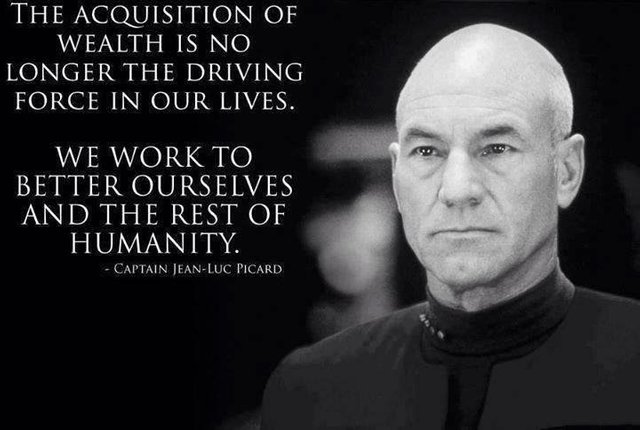Addicted to praise
On steemit lots of posts are about that good authors don't get rewards for their writings, good artickes go unseen and so on. I found many users who post once, don't get (enough?) money for it and don't post again. In this blogpost I try to show that the roots for this behaviour are layed in our early childhood. Also dangers of this style of upbringing are discussed and alternatives are shown.

"Good girl!" "Atta boy!" "Well done!" Sentences we all heard as a child and maybe even said to a child. We laud children for good deeds instead of hitting them for bad behaviour like our ancestors did. I hope we all agree that physically punishing a child is not good in any way. Maybe the child will stop misbehaving, but not because it learned why it is bad, but out of fear. Since Pestalozzi, Fröbel, Rousseau the many schools of progressive pedagogy despise the penalization of children, especially in a physical way. Laissez-faire pedagogy did this in the most radical way yet, not ordering children, not telling them, what to do. (In my eyes this is wrong, too, because the adults also have the right to be respected in their needs.)
Non-violently Up-Bringing
The new way of raising children is not to punish misbehaviour, but to praise wanted behaviour. We don't want to brake the child's will anymore, but to strenghen the child's personality, it's self-esteem. Children get a reward if they did a right thing. Rewarding means to give something to someone in appreciation of a behaviour. It can be material or verbal in form of a praise. A praise is a verbal, explicit message that contains a positiv assessment of a person, her_his behaviour or her_his performance (see Gordon, 2000). The aim of praise is to increase the childs motivation to show this behaviour again.
Motivation
There are two different kinds of motivation: intrinsic and extrinsic. Intrinsic motivation comes from the inside, meaning that the person herself has a good reason to do something, to track a certain target, even if faced with defeat. A quick example: Learning to walk is pure frustration tolerance, meaning you get frustrated because you fail, but you keep trying over and over again. Have you ever seen someone motivating a child with candy to stand up and walk? I hope not. Because this is purely instrinsically motivated. A child wants to walk for reasons inside of itself.
The second kind is extrinsic motivation, meaning you motivate someone from outside, promising something. "If you do your math homework, you'll get an ice cream afterwards." "If you show up to work, you'll get your paycheck at the end of the month." Both ways are legitimate, of course. Sometimes you need to extrinsically motivate someone to do a certain task (e.g. working a shitty job). Praise is one way to trigger extrinsic motivation: "I'll do it, so mommy says I'm a good girl."
"Good" Behaviour
Praising children for wanted behaviour is so widely spread, that almost no one doubts this method.
But the questions of who wants this behaviour and why need to be asked. The aim of any pedagogy is to form a childs behaviour and sometimes even it's personality. There are norms and values that a child in a certain society allegedly needs to learn. Adults claim the right to know what's "best". They decide what's right and what's wrong. We don't trust the child to make this decision. Often right behaviour simply means non-disturbing behaviour for adults. Everything that makes an adult's life easier is right: Following orders, being quiet, not asking questions, especially never questioning adult authority, ...
Will to please
A child has a need to please for it is dependent on an adult caregiver. Humans are born immature, we can't run away when threatend, we can't feed ourselfes for quite a long time and so on. We need the constant care of another grown person to survive. Consequently we don't want to do anything that puts us in danger of losing this relationship. A child wants to do things, that makes it's caregiver happy. In the end, children need the love of their caregivers and learn very quickly, that they can only get it by follwing their rules, by pleasing them. They adapt behaviour that is wanted and mostly don't show unwanted behaviour when told so. This aspect of pedagogy never changed, just the ways to accomplish this have.
It was never questioned why an adult wants a certain behaviour and why we think we have the right to tell the kid what to do and when to do it. We don't respect the will of the child, because we know better, we are older, we are stronger. Even laissez-faire isn't as free as you might think, because in the end it's the adults who allow kids to be that way. They can change their mind and as I read, they often did.
Effects of praise
As I showed above, kids need appreciation of their caregivers, they need the feedback that what they did was right, was liked by the adult, because they need their love (Kohn 2005). After overcoming violent styles of upbringing, parents try to modify their children's behaviour through praise. Do a "good" deed - get praise - do it again. That's the theory. One disadvantage of this method is simple: If there is no reward, I won't do it. If you don't pay me, I won't work. If you don't see me, I won't be nice to your friend that I dislike. It's like a dog, that will only sit if you have a cookie in your hand. So, praising a child promises only short-term success. But it gets worse...
A child learns that it only is appreciated when it acts properly. Making a mistake, "being bad" results in not being loved anymore. This puts an unspeakable pressure on a child. Imagine your spouse rejecting you because you had a hard day at work and are a little short tempered today. Imagine him or her ignoring you because you bought the wrong cheese. Making a mistake is human, it doesn't make you a lesser person. But by praising a child you give him exactly this impression: I will only love you, when you do the right thing (and I define right, but only tell you afterwards, so have fun finding out)! A child learns that it is not unconditionally loved but has to perform something to be loved. But a child should be loved without any condition and no matter what it does.
Often an adult praises the child to manipulate it, the grown-up wants to change the childs behaviour willingly, but without saying it directly. The reason for this is that the aim of the adult is not the well-being of the child, but her_his own needs. "Great job, you cleaned up your room!" It's not really the will of the child to have a tidy room, but the adults need for neatness. A child can sense this manipulation, but can't quite put it's finger on it. But it feels that it's being lied to and gets distrustful. The child-adult-relationship can be severly harmed by this. It's like when your spouse tells you you look great in a top or pants, because she_he wants you to wear it more often, which you don't because you think it does not look good on you. Something just does not feel right...
Mueller and Dweck (1998) found out, that praising the intelligence of children makes them prefer easier tasks and focusses their attention on the relation to others' performances. They get easily de-motivated through failure and even performe worse on tests. This is also a result of the pressure a child feels when being praised. It wants to stay as good to be again praised and this requirement becomes an obstacle.
Sometimes a child is praised for something an denies it. It does not fell that it is worth of praise for what it has done, because it doesn't like the picture it painted or it didn't climb really high or ran that fast or whatever. Kids have their own scales in evaluating their performance. Praise can challange these scales. This can have two effects: First, the kid lowers his own standards: If that's what's enough, I won't do any more that that. It does not fully exhaust his own potentials and does not evolve the way it could have. Second, the child can again question the adults integrety. It feels misunderstood, especially if it expressed it's own negaive feelings concerning own performances. This can hinder further communications between child and adult.
Another aspect is the neurobiological effect of praise. We feel good when someone lauds us. It can become a kind of drug. We need to be praised for what we did, again and again, to feel good again. Praise stimulates the reward centre in our brain, just like a drug does. And like a drug, we can get addicted to it. Kids, who get a lot of praise, tend to do something, ge to the adult, show her_him, get a praise and go away. They don't do it because they feel like doing it (e.g. drawing), but only because they want a "well done". There is no need to really interact with the adult, explain what they drew. They only want to hear the magic words. Then they do the next thing and again try to get the adults attention: "Mommy, mommy, look, what I can do!" If they don't get the attention, they stop doing it, because there is nothing they can get out of the activity alone. They lose their intrinsic motivation. Consequently they need extrinsic motivation for everything they should do. They don't find joy in doing what they liked to do without being praised.
Praise on steemit
As a result of an up-bringing with a lot of praise and a society that tends to externally motivating people for a lot of things, we can watch users on steemit crying out for not getting what they think they deserve. "Look what I've done!" But of course, seeing what some users get for their posts, we get envious. It's not enough to get a nice comment on how good a read this was. This praise is not enough anymore. We want money, goddamnit! Gimme, gimme, gimme, I did good! These individuals take no joy in just writing, in sharing their thoughts with others, in interacting, discussing with them. They compare their result (monetary) with these of others (see above) and lose interest in writing when "failing".
But does it mean failure to not make thousands of steem-dollars with every post? Some people read it and hopefully enjoy this. Maybe they learn something, maybe they think a thought they would not have thought without this post. It shouldn't be just about money, but after all we live in a capitalist world and "worth" is defined in terms of money. Even here. Sad.

Alternatives
What can be done to raise a generation that relies not only on praise and extrinsic motivation? And how can we still educate children, because there are things that children need to learn (e.g. resolving conflicts without violence).
Use I-messages or I-statements that tell you're counterpart, how her_his behaviour influences you. It shouldn't evaluate the kid's bahaviour or preach or manipulate it's behaviour. For example, if a kid sets the table, say "I'm happy you set the table for now I have more time preparing the meal."
Active listening shows the child, that you understand it and take it seriously. If a child tells you anything, you try to paraphrase it, tell him how you understand it, what you think it is feeling. This helps the child to gather a greater understanding of what is happening and take control of it's own life. If a child tells you: "That picture I drew is ugly!", you can say: "What makes you think it is ugly? What don't you like about it?" It's okay to not like what you did. ou help the child, if you find out what it doesn't like and help him improve his abilities.
If a child is doing something it likes doing, if it has fun doing it, just watch it! Don't say anything, don't risk the instrinsic motivation of the child! You don't need to get praise if you have sex, do you? You do it, because it's fun. Imagine your partner alsways saying: "Good job!" I mean, WTF!?
If a child wants you to pay him attention, mirror it's emotions. If he jumpes off a swing and cheers, cheer with him. If it waves at you, smiling, from the top of a big stone it climbed, wave back and smile. This shows the child that you see it, that you are happy for it and it's achievement, because the child itself is happy. If you think the child expects a verbal response, describe the situation without evaluation. A small child climbes the stairs alone and looks at you. You can say: "You climbed the stairs all alone!" It's on the child to judge it's performance. Or you can ask questions (if the child is able to answer you): "How did you manage to climb the stairs that fast?" This focusses the child's attention on the task, stimulates it thinking and talking about it and can intensify his interest in the task.
If the child does something nice for others, you can focus the childs attention on the results of it's doing: "Look how happy your brother is, because you shared your chocolate with him!"
It takes time to implement these strategies, because we're so used to saying "Good job!" But try it, don't give up. Maybe we can live in a world, where everyone does what she_he likes just because she_he likes it. Would be like Star Trek. No more money...

Qapla'!
Pitty
Yes, that's right, a part of steemian join steemit only want get reward (SBD, SP), but I agree with you the core purpose of steemit, is sharing experience, our fell, our joy and knowledge. I hope steemit go to right direction :)
We're the ones to change this.
Great article. Thanks for sharing, and sorry it didn't get more upvotes
: )
I write because I like writing. Fuck those upvotes ;) Now, where's my Pizza?
Congratulations @pittyvandefik! You received a personal award!
You can view your badges on your Steem Board and compare to others on the Steem Ranking
Vote for @Steemitboard as a witness to get one more award and increased upvotes!